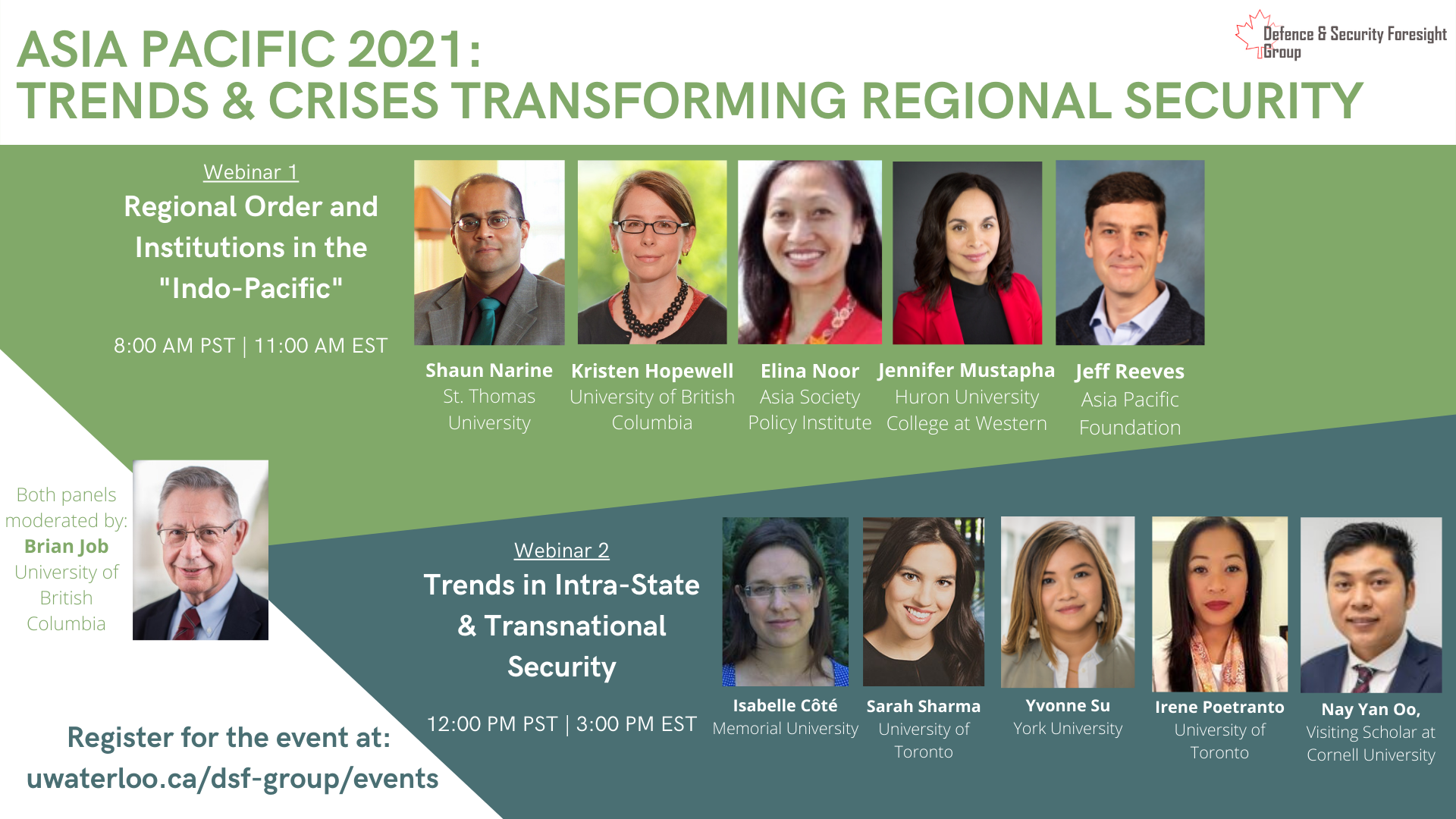
The Asia Pacific Team is bringing together Canadian and international experts with informed and distinct perspectives for two webinars on October 20, 2021.
More information on the webinars as well as biographies for the panelists and moderator can be found below.
Recordings
Webinar 1: Regional Order and Institutions in the Indo-Pacific: Canadian and Asian Perspectives
8:00 AM PST / 11:00 AM EDT
Recent events, including the establishment of the AUKUS, China-Taiwan engagement, and US-China strategic competition have escalated tensions and raised the risks of conflict in the Asia Pacific. Panelists with look to the transformation of the regions multilateral architecture, reflecting the strategic competition between the US and China, with the implications for Southeast Asia and middle powers, including Canada and Australia.
Panelists:
- Shaun Narine, St. Thomas University
- Kristen Hopewell, University of British Columbia
- Elina Noor, Asia Society Policy Institute
- Jennifer Mustapha, Huron University College at Western
- Jeff Reeves, Asia Pacific Foundation
Moderated by Brian Job, University of British Columbia
Biographies for panelists and moderator can be found here.
Webinar 2: Trends in Intra-State and Transnational Security: Asia Pacific 2021
12:00 PST / 15:00 EDT
The well-being and security of Asian populations are most directly and immediately affected by so-called non-traditional security concerns. Participants in this webinar will share their expertise on the impacts of the co-vid pandemic, migration and refugees, transnational violence, civil resistance to the state, and environmental disasters across a broad geographic scope from China to India and through Southeast Asia, with special attention to Myanmar.
Panelists:
- Isabelle Côté, Memorial University
- Sarah Sharma, University of Toronto
- Yvonne Su, York University
- Irene Poetranto, University of Toronto
- Nay Yan Oo, Visiting Scholar at Cornell University
Moderated by Brian Job, University of British Columbia
Biographies for panelists and moderator can be found here.
Webinar 1: Regional Order and Institutions in the “Indo-Pacific:” Canadian and Asian Perspectives
8:00 AM PST / 11:00 AM EDT
Recent events, including the establishment of the AUKUS, China-Taiwan engagement, and US-China strategic competition have escalated tensions and raised the risks of conflict in the Asia Pacific. Panelists with look to the transformation of the region’s multilateral architecture, reflecting the “strategic competition” between the US and China, with the implications for Southeast Asia and middle powers, including Canada and Australia.
Panelists
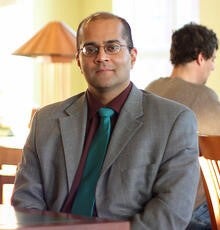
Shaun Narine, St. Thomas University
Dr. Shaun Narine is a Professor of International Relations in the Political Science Department at St. Thomas University. He is the Director of the International Relations Program. Dr. Narines research has focused on institutionalization in the Asia Pacific region. He has written two books on the Association of Southeast Asian Nations (ASEAN): Explaining ASEAN: Regionalism in Southeast Asia (2002) and The New ASEAN in Asia Pacific and Beyond (2018). He has published articles on ASEAN, sovereignty, human rights in Southeast Asia, Chinas civil-military relations, and numerous other topics in the leading journals in the field. He has also written extensively on a number of other topics, including Canadian foreign policy, Japans relations with Southeast Asia, and the US role in the Asia Pacific region. Dr. Narine completed his Ph.D at the University of Toronto (1998). He was a Visiting Fellow at the East-West Center (2000), a Killam Postdoctoral Fellow at the University of British Columbia (2000-2002) and a Visiting Fellow at the Institute of Southeast Asian Studies-ISEAS (2017). His current research focuses on Canadas relations with China and the Huawei problem.

Elina Noor, Asia Society Policy Institute
Elina Noor is Director, Political-Security Affairs and Deputy Director, Washington, D.C. Office at the Asia Society Policy Institute. A native of Malaysia, Elinas work focuses on security developments in Southeast Asia, global governance and technology, and preventing/countering violent extremism. Previously, Ms. Noor was Associate Professor at the Daniel K. Inouye Asia-Pacific Center for Security Studies. Prior to that, she was Director, Foreign Policy and Security Studies at the Institute of Strategic and International Studies Malaysia. While there, she also served as the Secretary for the Council for Security Cooperation in the Asia Pacific, a 21-member Track II regional security network. She was also formerly with the Brookings Institutions Project on U.S. Relations with the Islamic World. Between 2017 and 2019, Elina was a member of the Global Commission on the Stability of Cyberspace. She currently serves on the ICRCs Global Advisory Board on digital threats during conflict. Ms. Noor read law at Oxford University. She obtained an LL.M (Public International Law) from The London School of Economics and Political Science, University of London, graduating with distinction at the top of her class. A recipient of the Perdana (Malaysian Prime Ministers) Fellowship, she also holds an MA in Security Studies from Georgetown University where she was a Women in International Security Scholar.

Jeff Reeves, Asia Pacific Foundation of Canada
Dr. Jeffrey Reeves is Vice-President of Research Strategy for the Asia Pacific Foundation of Canada. Prior to joining APF Canada, Dr. Reeves was the Director of Asian Studies at the United States Army War College in Carlisle, Pennsylvania. Dr. Reeves has over 15 years direct experience living and working in Asia, including as an Associate Professor with the Daniel K. Inouye Asia Pacific Center for Security Studies in the United States, as a Research Fellow with Griffith University in Australia, and as a University Instructor at Peking University in the Peoples Republic of China. Dr. Reeves has worked with the United Nations Development Program and World Wildlife Foundation in Beijing and as a Research Assistant with the London School of Economics and Political Sciences (LSE) Asia Research Centre in London. Dr. Reeves served in the United States Peace Corps from 2001 to 2003 in Khovd, Mongolia. Dr. Reeves has published extensively on politics, and security in Asia, including the books Chinese-Japanese Competition and the East Asian Security Complex: Vying for Influence (Routledge 2016), Chinese Foreign Relations with Weak Peripheral States: Asymmetrical Economic Power and Insecurity (Routledge 2015), and Non-Traditional Security in East Asia: A Regime Approach (Imperial College Press 2015). Dr. Reeves received his PhD from the LSE and his masters degree in Chinese Studies from the University of Edinburgh.

Jennifer Mustafa, Huron University College at Western
Dr. Jennifer Mustapha researches and teaches at the intersection of a number of different areas of interest and expertise. In particular, an over-arching theme in her work pertains to the broader question of how ideas and institutions matter in constructions of identity and governance. In 2019 her first monograph was published by Routledge, and it has so far been well received by regional security scholars. The book examines narratives and discourses of security in Southeast Asia in the context of the US-led War on Terror and provides a starting point for some of her current and ongoing research projects. Dr. Mustapha has published several articles on East and Southeast Asian regional security politics in particular, and on theorizations and understandings of security more generally. She is active in the academic community, having served on the executive and boards of academic associations and journals. She has also been asked to share insights in media commentary on topics like the Trump Administrations East Asia policies; coverage of terrorism in popular news media; and pedagogical challenges presented by the contemporary digital landscape.
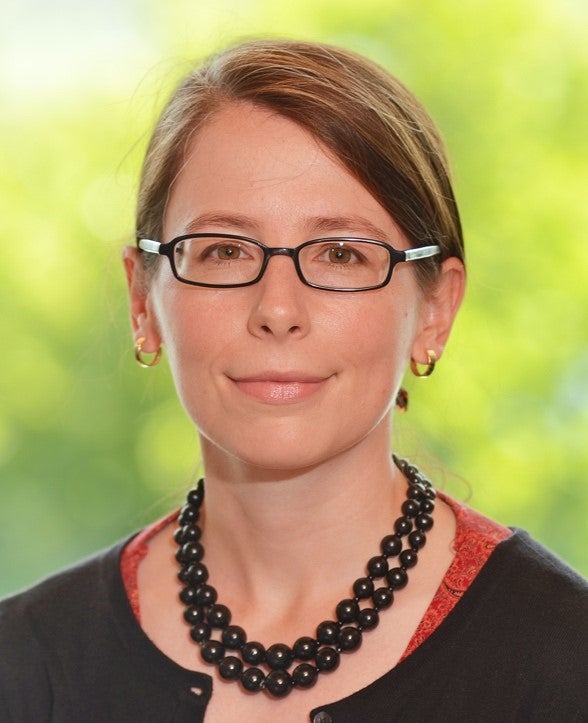
Kristen Hopewell, University of British Columbia
Dr. Kristen Hopwell is an Associate Professor in the School of Public Policy and Global Affairs at the University of British Columbia. Her research specializes in international trade, global governance, industrial policy and development, with a focus on emerging powers such as China. She is the author of Clash of Powers: US-China Rivalry in Global Trade Governance (Cambridge University Press, 2020) and Breaking the WTO (Stanford University Press, 2016). Her policy writings have appeared in Foreign Affairs and The Washington Post, and her analysis has been featured in outlets such as the BBC, CNN, CBC, Bloomberg, and Reuters. She received her PhD from the University of Michigan and has held visiting fellowships at Peking University (China), the Max Planck Institute (Germany), and the Graduate Institute of International and Development Studies (Switzerland). Her research has been supported by the National Science Foundation, Economic and Social Research Council, Social Science and Humanities Research Council, and a Fulbright Fellowship.
Moderator

Brian Job, University of British Columbia
Dr. Brian L. Job (PhD, Indiana University) is Professor of Political Science and a resident Faculty Associate of the School of Public Policy and Global Affairs at the University of British Columbia. He joined the UBC faculty in 1989, having previously been on the faculty of the University of Minnesota. He has served as Director of the Centre of International Relations, Interim Director of the Liu Institute, and Associate Director of the Institute of Asian Research. His current teaching and research interests concern international securitymore specifically, the evolving security order of the Asia Pacific, intrastate conflict, human security, and Canadian foreign and security policies. His current research concerns UN peacekeeping, the protection of civilians in conflict, Canadian security policy, and security relations among Asian states and peoples. Dr. Job has been actively involved in Asia Pacific expert networks, particularly with the Council of Security Cooperation in the Asia Pacific (CSCAP). He has been co-editor of International Studies Quarterly, and of Global Governance, and serves on the Editorial Boards of the International Journal and of International Relations of the Asia Pacific. Job has been a visiting professor at Aoyama Gakuin University, Tokyo; Nanyang Technical University, Singapore; and the Australian National University.
Webinar 2: Trends in Intra-State and Transnational Security: Asia Pacific 2021
12:00 PST / 15:00 EDT
The well-being and security of Asian populations are most directly and immediately affected by so-called “non-traditional” security concerns. Participants in this webinar will share their expertise on the impacts of the co-vid pandemic, migration and refugees, transnational violence, civil resistance to the state, and environmental disasters across a broad geographic scope from China to India and through Southeast Asia, with special attention to Myanmar.
Panelists

Sarah Sharma, PhD Student at Queens University
Sarah Sharma is a Vanier Scholar in International Relations in the Department of Political Studies at Queens University. She has recently completed fieldwork for her doctoral dissertation, which examines how urban flooding is being governed through a global policy paradigm, climate resilience, to understand the unique position cities are in when adapting to climate change. Her two case studies are Amsterdam, the Netherlands and Dhaka, Bangladesh, two diverse locales that both grapple with heightened urban flooding from intensifying rainstorms. In undertaking field research, Sarah was a Visiting Research Fellow at the International Centre for Climate Change and Development (ICCCAD) at the Independent University, Bangladesh (IUB), in Dhaka, Bangladesh, and a Visiting PhD Scholar at Vrije Universiteit Amsterdam in the Department of Political Science and Public Administration, in Amsterdam, the Netherlands.
Previously, she was at the United Nations Conference on Trade and Development (UNCTAD) in New York City working as an Economic Affairs Consultant. Sarah received her Bachelor of Arts (Honours) in Global Development Studies from Queens University and her Masters in International Political Economy from the University of Manchester. Sarah is interested in global governance and development, political ecology, the international financial system, urban politics and how these themes interact with gender and racial equality. Her project is supervised by Dr. Susanne Soederberg (Global Development Studies).
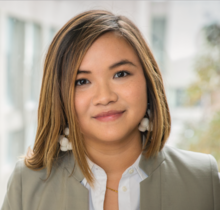
Yvonne Su, York University
Yvonne Su is an Assistant Professor in Interdisciplinary Refugee and Diaspora Studies in the Department of Equity Studies at York University. She is a member of the Centre for Refugee Studies and the York Centre for Asian Research.
Yvonne is a specialist on forced migration, climate change-induced displacement, migrant remittances, social capital, global migration governance, humanitarian assistance and post-disaster recovery. She holds a PhD in Political Science and International Development from the University of Guelph and a Masters in Refugee and Forced Migration Studies from the University of Oxford. For her dissertation, she spent 7 months in the Philippines researching the role of migrant remittances in post-disaster recovery after Typhoon Haiyan.
Currently, Yvonne holds two SSHRC Partnership Engagement Grants - the first to study the impact of COVID-19 on Venezuelan LGBTQI+ asylum seekers in Brazil and the second to study the impact of COVID-19 on disaster-affected households in resettlement areas in Tacloban City, Philippines. She also holds a SSHRC Explore Grant from York University to examine the use of UNHCR Smart Cards in the Rohingya Refugee Camps in Bangladesh.

Irene Poetranto, University of Toronto
Irene Poetranto is a doctoral candidate in the Department of Political Science at the University of Toronto, and a Senior Researcher for the Citizen Lab, an interdisciplinary research lab on digital technology and human rights at the Munk School of Global Affairs Public Policy, University of Toronto. She has a Masters degree in Political Science and Asia Pacific Studies from the University of Toronto and a Bachelors degree in Political Science from the University of British Columbia.

Isabelle Côté, Memorial University
Isabelle Côté is an Associate Professor in the Department of Political Science at Memorial University of Newfoundland. Her research investigates the role of internal population movements on intrastate conflict and contentious politics in East and Southeast Asia. In particular, she investigates the violent clashes between ethnically-distinct native people and internal migrants i.e. Sons of the Soil (SoS) conflict - in authoritarian China and newly democratizing Indonesia. Recently, she has also explored the impacts of political, economic and ecological resettlement programs in Asia, Europe and North America. Her work has been published in numerous journals including, among others, Studies in Conflict and Terrorism (runner up for the 2018 Jill Vickers Prize for best paper on Gender and Politics); Canadian Journal of Political Science; Commonwealth and Politics; Democratization; Ethnopolitics; and has co-edited a volume on Sons of the Soil conflict published with Routledge (2019). She currently serves on the Executive Boards of the Canadian Council of Southeast Asian Studies (CCSEAS) and the ISA-Political Demography and Geography Section, and is a former President of the Atlantic Provinces Political Science Association (APPSA). She received her PhD in Political Science from the University of Toronto, held various guest researcher positions in China and Indonesia, and was a postdoctoral fellow at KITLV (Royal Netherlands Institute of Southeast Asian and Caribbean Studies) in Leiden (Netherlands).
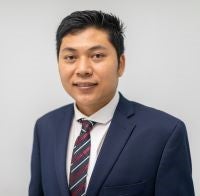
Nay Yan Oo, Visiting Scholar, Cornell University
Nay Yan Oo is a visiting scholar in the Southeast Asia Program (SEAP) at Cornell University. He previously worked as a technical advisor for the Governance Program at The Asia Foundation in Myanmar, a resident fellow at the Pacific Forum in Hawaii, and a Program Manager at the Friedrich Naumann Foundation for Freedom in Yangon. Nay Yan ran for Myanmar parliament in the 2020 election from the Peoples Party and exposed several scandals of the National League for Democracy government (2016-2020). He has a Master of Public Policy from the University of Oxford and an MA in Political Science from Northern Illinois University. He is the founder and host of Trends in Myanmar a political talk show.
Moderator

Brian Job, University of British Columbia
Dr. Brian L. Job (PhD, Indiana University) is Professor of Political Science and a resident Faculty Associate of the School of Public Policy and Global Affairs at the University of British Columbia. He joined the UBC faculty in 1989, having previously been on the faculty of the University of Minnesota. He has served as Director of the Centre of International Relations, Interim Director of the Liu Institute, and Associate Director of the Institute of Asian Research. His current teaching and research interests concern international securitymore specifically, the evolving security order of the Asia Pacific, intrastate conflict, human security, and Canadian foreign and security policies. His current research concerns UN peacekeeping, the protection of civilians in conflict, Canadian security policy, and security relations among Asian states and peoples. Dr. Job has been actively involved in Asia Pacific expert networks, particularly with the Council of Security Cooperation in the Asia Pacific (CSCAP). He has been co-editor of International Studies Quarterly, and of Global Governance, and serves on the Editorial Boards of the International Journal and of International Relations of the Asia Pacific. Job has been a visiting professor at Aoyama Gakuin University, Tokyo; Nanyang Technical University, Singapore; and the Australian National University.